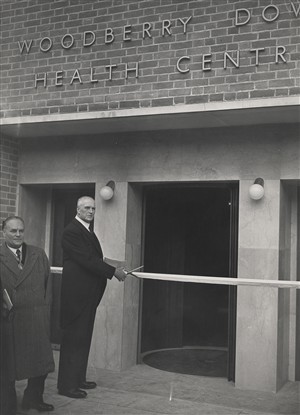Mr Somerville Hastings (1878-1967)

Somerville Hastings cutting the ribbon, October 1952
© London Metropolitan Archives
Labour MP
Somerville Hastings was born in 1878 in Wiltshire. He was the son of Henry George Hastings, a Congregationalist minister, and Ellen Ward. Hastings was educated at Wycliffe College in Gloucestershire. He won a medical scholarship to University College and the Middlesex Hospital in London.
After the First World War Hastings emerged as an important figure on the medical left. As well as being a Labour MP for Reading he also became a leading member of the Labour Party's public health advisory committee.
Hastings was active in labour and medical reform politics. By the 1920s he had formulated what were to remain his core beliefs. Hastings's vision of a health service was to have an integrated hospital system with salaried medical personnel, and no private practice. Free and comprehensive services were to be organised around health centres, with an accompanying shift from curative to preventive medicine.
In 1930 Hastings helped form the organisation with which he is most closely associated, the Socialist Medical Association, which affiliated to the Labour Party in 1931. Hastings was its founding president and he retained the presidency until 1951. He expended considerable energy, particularly in the association's crucial pre-war and wartime period, on socialist medical politics. He was often the association's delegate to the Labour Party conference, and was instrumental in having the party commit itself by 1934 to a national health service. He wrote and lectured extensively on his vision of a socialised medical service, and travelled abroad to study foreign medical systems and meet other socialist doctors. Most significant of all was his election in 1932 to the London County Council as member for Mile End. Hastings held this seat until 1946, during which time he served as chairman. Thereafter he was, from 1946 to 1964, an alderman, and he continued to serve on various committees. He was also a member of the London Labour Party's executive committee from 1934 to 1950.
Membership of the London County Council was Hastings's most successful and important venture into politics. In 1934, after Labour took control, he was chairman of its hospital and medical services committee for ten years. As London was the largest provider of hospital beds in the country, this was a great responsibility. His council experience confirmed Hastings's view that medical services should be provided by democratic local bodies.
During the Second World War the influence of Hastings and the Socialist Medical Association increased. He was one of the three original association representatives on the British Medical Association's medical planning commission; and he was chairman of Labour's revived advisory committee on public health – a body charged with formulating proposals for a national health service. It seemed possible that Hastings's vision of a socialised medical service would be realised, given his own and his organisation's heightened influence in labour and medical politics.
He claimed publicly that the post-war Labour government's National Health Service was in large part attributable to the work of the Socialist Medical Association. However, not all that Hastings desired was achieved. The minister of health, Aneurin Bevan, would have little to do with Hastings or the association. Bevan created a centrally controlled system and made concessions to the medical profession over issues such as private practice. Although a commitment was made to develop health centres, this only happened at the John Scott Health Centre. Despite his difference of opinion Hastings did welcome and defend the National Health Service, but viewd it only as the first step towards a socialised medical service.
Hastings deserves acknowledgement as a pioneer of socialised medicine. He was a lifelong Christian and teetotaller, and seemed to lead an austere life. Hastings typified the altruistic, middle-class Christian socialist of his time.
In 1945 Hastings became Labour MP for Barking, a seat he held until his retirement in 1959. He died in 1967.
Source: Dictionary of National Biography
Two doctors debate the pros and cons of state organised medicine
This page was added by
Lisa Rigg on 11/02/2010.